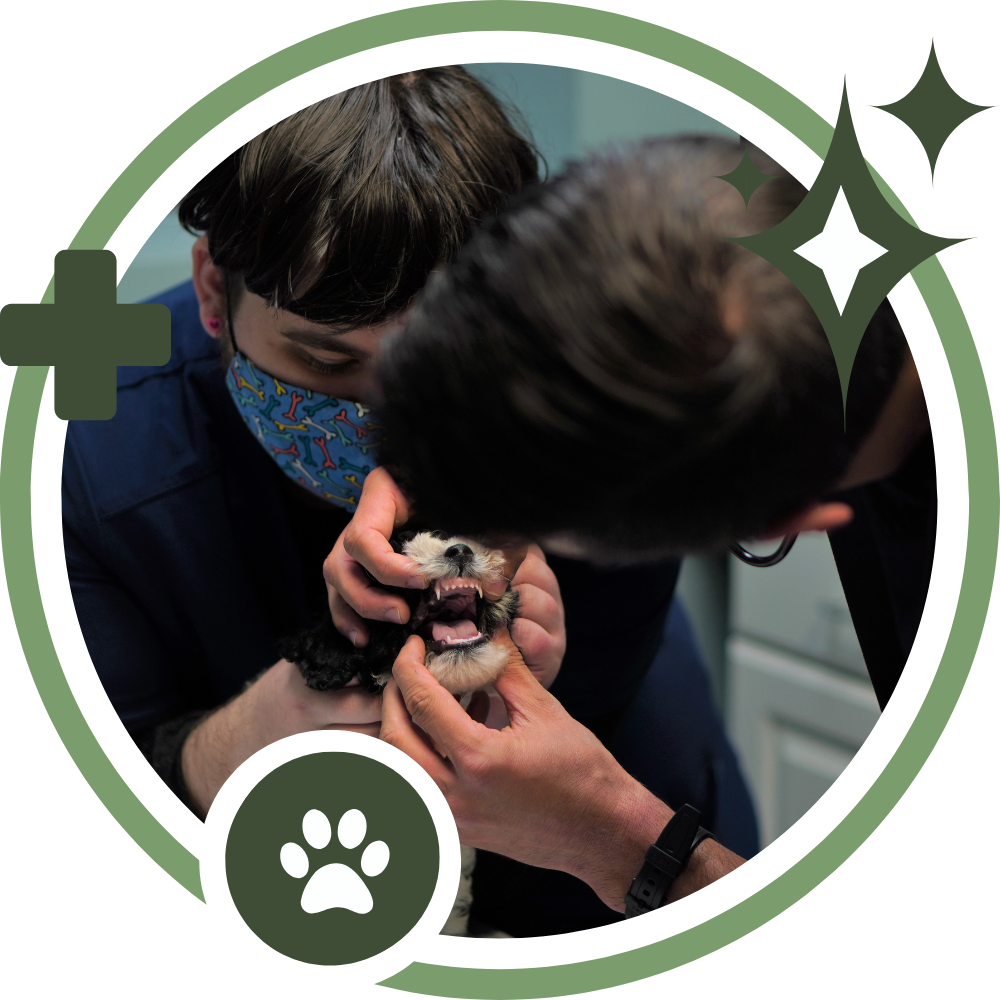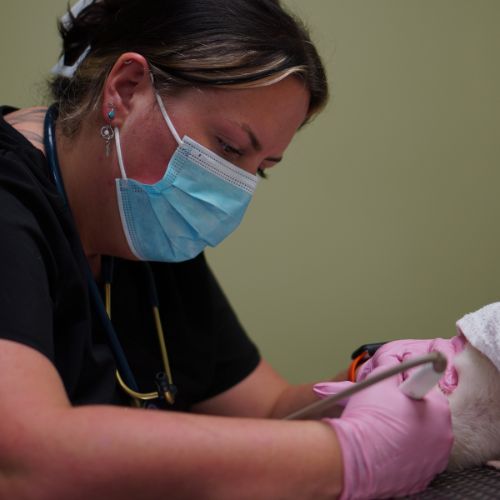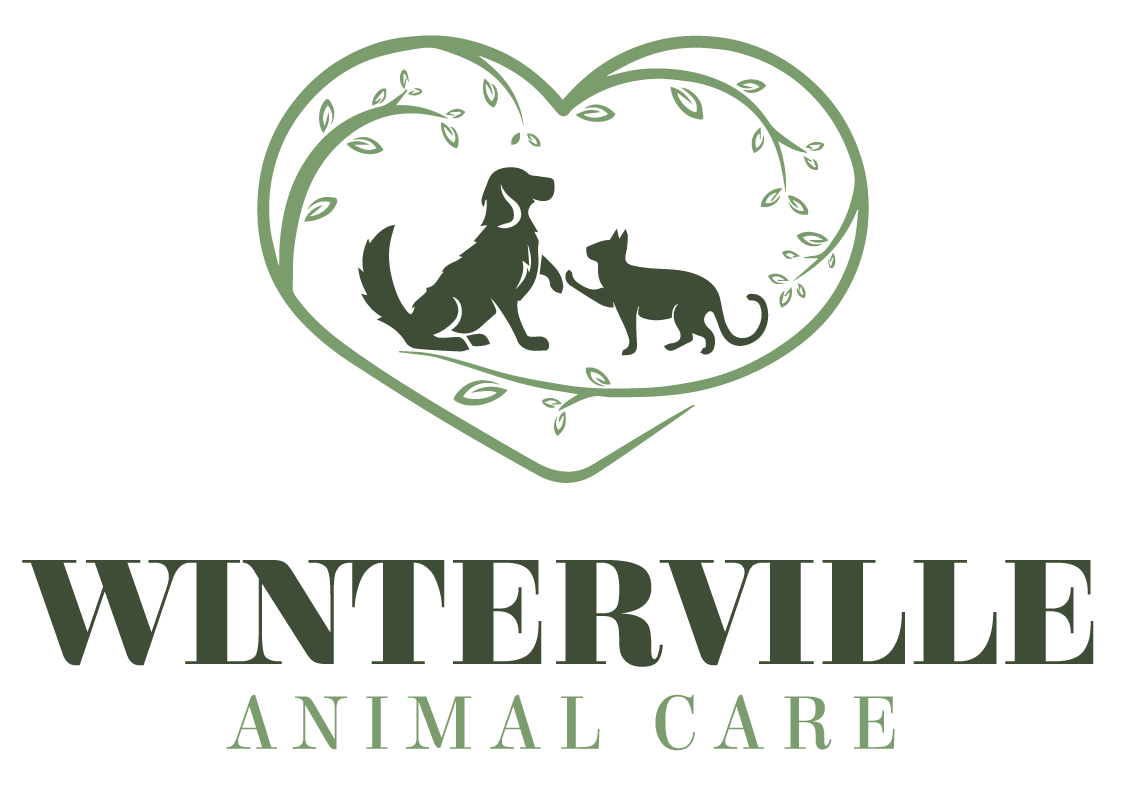Pet Dental Care
Bad breath is just one sign of dental disease. If your pet’s smooches make you wrinkle your nose, it’s time for a trip to the vet!

Pet Dental Care in Winterville, NC 28590
Your pet’s teeth are vital for their overall health and well-being. Cats and dogs use their teeth for everything: eating, playing, grooming, and even protecting themselves! When teeth and gums are damaged by dental disease, it can be difficult and painful to do many of these essential things. At Winterville Animal Care, we focus on offering proactive dental care that prevents dental disease altogether with comprehensive and routine cat and dog teeth cleaning.

What’s the Danger with Pet Dental Disease?
Dental disease in dogs and cats does more than affect the mouth. In time, it can affect your pet’s systemic health. Let’s take a look at all the negative ways dental diseases can impact your pet’s health.
- Gingivitis – Gingivitis refers to gum inflammation and is one of the earlier stages of dental disease. Look for reddened and bleeding gums to identify gingivitis.
- Periodontal disease – When plaque and tartar collect on your pet’s teeth, the bacteria within them slowly begin to break down the enamel, gum tissue, and eventually, the roots and bone of the teeth. Plaque and tartar below the gum line are the most damaging.
- Tooth resorption – While it’s not completely clear what exactly causes tooth resorption, dental disease certainly doesn’t help. Tooth resorption is particular to cats and erodes the dentin (or bone) of the tooth. If left untreated, the entire tooth could become involved.
- Loose and damaged teeth – Periodontal disease, and indeed, tooth resorption, set the stage for loose or damaged teeth. This can cause significant discomfort and even result in teeth falling out.
- Heart, liver, and kidney disease – If left untreated, the bacteria in your pet’s mouth will leak into the bloodstream and contribute to diseases of the heart, liver, and kidneys, affecting your pet’s entire systemic health.
How to Treat Dental Disease in Dogs & Cats
Treating dental disease requires some consistency in your pet’s home care as well as regular visits to the vet. Here’s how you can play an active role in their dental care:
- Brush their teeth daily! This may sound like a challenge, but it’s worth the work! Brushing your pet’s teeth is the single best thing you can do to prevent plaque and tartar build-up on the teeth. But we know that it’s not always possible with some pets so we also recommend…
- Using dental health products. These include things like CET chews, dental treats, dental toys, water additives, oral rinses, prescription tartar-control diets, and more. There are loads of options for helping to reduce the plaque and tartar build-up on your pet’s teeth, and we’ll be happy to help you find the best product for them!
- Bring your pet to the vet for regular check-ups and professional teeth cleanings. Even with the best at-home care regimen, your pet will still need routine professional teeth cleanings. Think of us as your pet’s dentists. We’ll perform a complete oral assessment and thorough cleaning to keep your pet’s smile fresh and pearly white!
Our Professional Teeth Cleaning Services for Cats and Dogs in Winterville, NC 28590
Cat and dog teeth cleaning demands that we use general anesthesia for your pet’s health and safety. It also helps us do a more thorough job by allowing us the time and ability to clean the areas of your pet’s teeth that lie below the gum line. We take all the safety precautions necessary to ensure your pet has a smooth, risk-free procedure.
Our teeth cleaning services generally include:
- Digital dental X-rays to evaluate your pet’s teeth and roots below the gum line
- An oral examination looking for signs of diseases including periodontal pockets and tooth damage
- Ultrasonic and hand scaling to remove plaque and tartar from each tooth’s surface
- Polishing of each tooth’s enamel to reduce future tartar buildup
- Removal of damaged or broken teeth, if necessary (we’ll ask your permission before we proceed)
For pets who require extractions, we’ll also make sure to provide them with ample pain medication to speed their recovery and reduce their discomfort.
